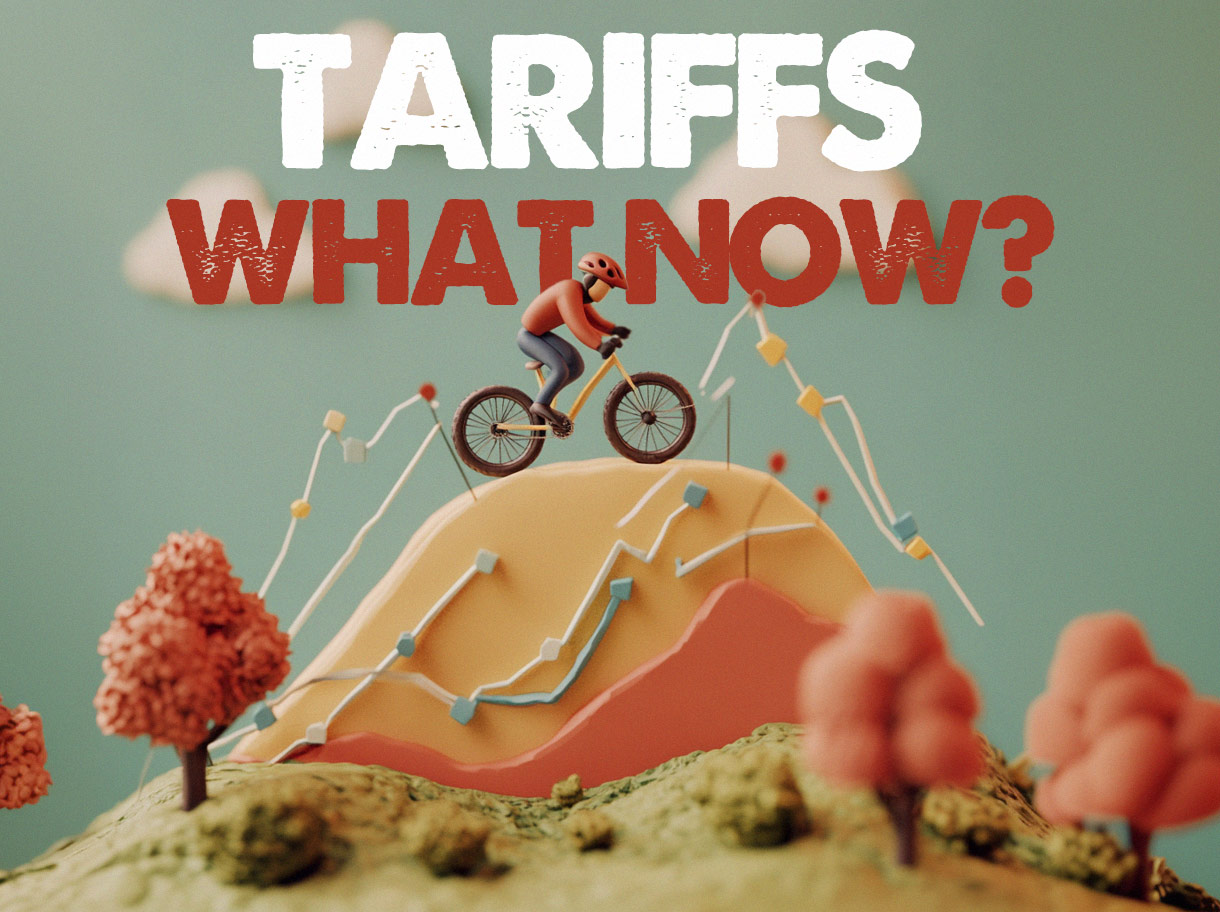
Steve The Intern
Tariffs! So what now?
- ,
- , Food for thought, The Lab
This present moment in history seems like a good time to pause from our traditional focus on riding bikes and seeking adventure. Instead, whether you know it or not yet, a whole lot in the world changed this week, and it is going to affect bikes, non-bikes, people, the economy, geopolitics, and possibly even a colony of penguins on an uninhabited island near Antarctica.
Disclaimer: I am very much not an expert in most anything that I will write about below, save for being an expert in running exactly one bike company, called Rodeo Labs, that is trying to navigate the huge changes that are happening in the world. There may be many errors in what I write. If and when you find them, feel free to correct me in the comments and educate me and anyone else who cares to learn more. If anything, what I’m going to write is in fact myself attempting to think through what is happening, and how it will affect Rodeo Labs, our customers, and the cycling community.
I was having a relatively solid day on Wednesday, April 2nd, as the usual flow of Rodeo Labs customer emails, calls, and office meetings slowed down in the late afternoon. It was probably 4:30pm. “What will you work on today?” is the phrase that Drew and I sarcastically ask each other at about this time as our remaining grains of productive moments until tomorrow empty out of the hourglass.
I decided to check the news, which I hadn’t seen all afternoon. As nearly anyone knows these days, one mustn’t sleep on the news in 2025, because in any given 30 minutes the sheer volume of potential economic and political change that is happening will give you whiplash. On Wednesday, even more so.
If you hadn’t heard, Wednesday was so called “Liberation Day”, as deemed by Trump & Co. Such is the context window of the modern American, that I suspect a certain number of people may have seen the headlines surrounding it and thought: “Sounds great, hit me with some of that good good Liberation!”.
In reality of course, and as I soon found out, Liberation day was the day chosen to announce a raft of trade (import) tariffs on seemingly every country in the world, and even more than a few non-countries, some inhabited by precisely zero humans and instead a few thousand penguins. While the latter fact is funny, the former fact isn’t at all a laughing matter, it’s a huge deal. As a baseline, nearly everything imported into the USA is now going to be subjected to a base 10% import tariff. It doesn’t stop there though, the White House is also assessing additional per-country tariffs at varying significant, and often stunning rates. Here’s a quick chart that I gathered from CNN:
The true cumulative total for tariffs is, quite honestly, difficult for me to calculate, because I’m not sure if they are cumulative, compound, or some other math, or non-math applied to how they function. For instance, many sources report the cumulative tariff rate for goods imported from China being 54% as of April 9th, but in other conversations that I’ve had, I’ve heard 81% as the number. (11% original + 26% 301 Duties + 20% Trump Tariff + 25% Venezuelan oil importer tariff). I’m not sure anyone knows what the real number is, possibly including the present government agencies that will be tasked with enforcing all of this. And even if anyone knew what the number was, it will probably be a different number tomorrow, between some countries being reported as already negotiating on tariffs, and others fully ready to go to the mat on them.
Yeah but I’m just a cyclist, why should I care?
You should, as a cyclist, probably care about all of this for a couple of reasons. The first reason: The overwhelming majority of cycling products consumed in the USA are manufactured overseas. Secondly, if you’re a cyclist you might also be a human. These tariffs are going to impact the supply chains and prices of, once again, the vast majority of goods purchased and consumed in the United States because, for better or worse, the USA stopped or reduced manufacturing most “things” many many decades ago, be that bikes, clothes, appliances, computer chips, steel, and most everything else.
Side note, even if the USA stopped making “things”, we’ve continued to create valuable ideas, and I would wager that we are still the most prolific nation in the world when it comes to creating and exporting (selling) ideas. Many of those ideas have tremendous value, and could be argued to be more important than making “things”. But I digress. Feel free to discuss and argue the relative merits of creating things vs ideas with someone smarter than myself. As a cyclist, I like things.
You should care about all of this, about “Liberation Day”, because in a lot of ways it’s effect on the cycling world is probably the least important thing to consider. It will affect the economy, employment, stock markets, retirement accounts, interest rates, probably the national debt (does anyone remember the national debt? It’s 37 trillion now.). Tariffs will affect what you buy at the grocery store. Tariffs will affect how much it costs to change the tires on your car. Tariffs will affect the cost of Ziploc bags, it will affect… deep breath… how much smartphones cost. Smartphones are definitely what matters the most here. We all know that.
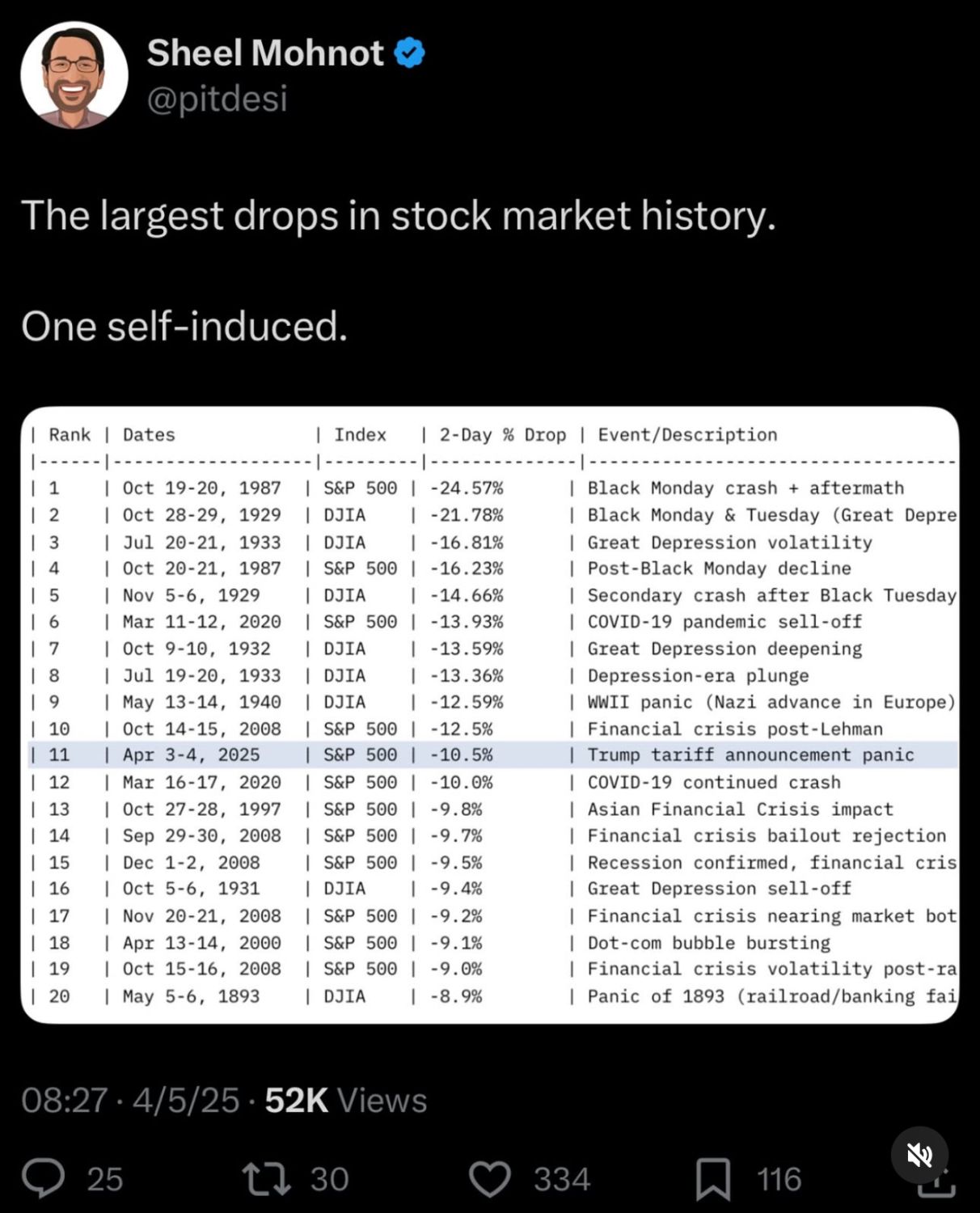
But, back to square one. Let’s not get overwhelmed. Let’s stick to bikes! Yay, bikes.
We should look at some math together. I’m not going to use real numbers, but I’ll try to paint a picture. Let’s say a bike from Brand X is made and assembled in China. Let’s say that bike cost $1000 all-in. Until late last year, that bike might have been made for $1000, then tariffed at 20%, and maybe cost $25 to transport in a shipping container to the USA. So, all-in maybe that bike cost $1225 to create and bring to the United States. With those costs in mind, a bike brand has to add it’s markup to the bike in order to create a profitable sales margin. For the purposes of this exercise, let’s assume that number is 50%. So, that bike that cost $1225 to make and land in the USA will sell to a consumer for double that number, $2450. Wait, so bike companies make $1225 in profit on that bike? Not at all! Bike companies have to pay for rent, utilities, employees, R&D, advertising, taxes, and an innumerable amount of other cost parasites that drain much (or all) of that margin from the bike company. But, if you’re smart, or lucky, or cunning, once all of those costs are added up, there might be some net profit left in there for the owner of the bike company to buy a yacht. But let’s be honest, most bike companies make no money. They burn bright like the shining supernovas that they are, only to vanish without a trace nearly as fast as they came upon the scene. No bike company is safe. Death, taxes, and dead bike companies are the only certainties in life.

Now, those fuzzy numbers in the last paragraph were pre-tariffs. What will happen to the cost of that bike if the cumulative tariffs on bikes imported from China are 85%?
$1000 to make it, now $850 in import tariffs, and $25 in transport costs = $1875. With the keystone 50% margin, the retail price now becomes. $3750. That’s a very sudden increase of cost of $1,300 on a $2500 bike. Much wow. Maybe the bike company is kind and simly passes through the import duties instead of marking them up with margin, but probably not, because corporations aren’t fundamentally kind, they’re in it to cover their risks and make money.
Now, does my overly simplistic financial model really represent reality? I’m sure it has less than 100% accuracy. Maybe the cumulative China tariffs aren’t 85%, maybe they are 55%. Maybe the equation is simplistic and flawed. Also maybe it doesn’t matter if I’m precisely right. Will the tariffs cause that bike to increase $100 or $1300? Both numbers represent an important increase in price, especially when we aren’t just talking about bikes, we’re talking about nearly everything that most Americans consume these days. Are you bothered that the price of a dozen eggs went from $3.50 to $8.50? This is vastly more significant than $5, and unlike eggs, or any other food, you don’t HAVE to buy new bike stuff, so many people will choose not to.
Are prices for sure going up then?
So, does that mean that all bikes and / or bike parts are instantly more expensive than they were last week, or are they about to be more expensive? Short answer: I don’t see the prices jumping at this exact moment, today, as I write this, but it could happen tomorrow, and it will almost certainly happen sometime soon. We called around to key vendors to ask what they’re going to do next. Should we hoard components at present pricing? Should we give ourselves as big of a cost buffer as we can afford? Nobody was willing to give us any actionable info, not the billion dollar component brand, not the tiny independent widget seller. I think that tells us all something important: Nobody has insider info, nobody knows what is going to happen. Keep your eyes peeled though. I think it’s safe to say that things are going to cost more.
Even if you don’t see impacts as of today Apr 5, 2025, the impacts are already being felt behind the scenes. Just yesterday, the owner of BikesDirect.com called into a podcast and offered that he had just refused delivery of 30 container loads of bikes that are on the water heading for the USA, explicitly because of the new tariffs. His costs on those bikes just increased by 35% or more, and that doesn’t fit his pricing or business model, so he is simply refusing the shipment. This is existential, survival level decision making.
Need more beta? E-Bike maker Tern is on record of facing nearly a million dollars in unexpected tariffs if they can’t get their next shipment landed in time. A million dollars in sudden, unplanned, expenses aren’t something that most or any bike company can simply absorb. Drastic times, drastic measures.
As much as all of this is being talked about in the wider economy, it’s more amazing how much the bike industry doesn’t seem to be talking about it at all yet, at least not on the record. From my perspective, the bike industry has always been a “look at what everybody else is doing and do that” sort of industry. But so far I haven’t gotten wind of any major pricing changes or strategic decisions being made in light of the thousand foot economic tsunami heading our way.
This is, truly, the most eerie silence I’ve experienced in the bike industry in all of my short eleven years working in the space. The only thing that comes close to this sensation is March 2020, the Covid era. There was an eerie calm, an eerie silence, and then everything went a bit mad. Even that situation is apples to oranges when compared to this one. I don’t think anyone has a frame of reference for this moment in history unless you look back 100 years or so, when tariffs were also, for a moment, about this high. Consensus seems to be that it didn’t go well.
Nature abhors a vacuum though. And by nature I mean customers. Customers have been reaching out to us already. At first it was gallows humor “whoa how about those tariffs, ha ha ho ho, oof”. Then it was “hey are prices going to go up?”. Then it was “I shouldn’t buy a bike right now, but should I buy a bike right now?”
Given the total lack of overall bike industry reaction, I’m simply left with people looking at me asking what I’m going to do, and what Rodeo is going to do. The truth of the matter is; I don’t know yet what I’m going to do, and what Rodeo is going to do. But if we put a little bit of thought into the abstract ideas at play, I’ll bet we can game this out.

Existing Inventory
Existing inventory is all of the product that we, or any other business have landed, in our warehouse, in the USA. Rodeo doesn’t import complete bikes. We import framesets, rims, clothing, and other miscellaneous hardware that we then turn into bikes here. We paint frames, build wheels, and build bikes here one at a time, so not everything that we do is done overseas.
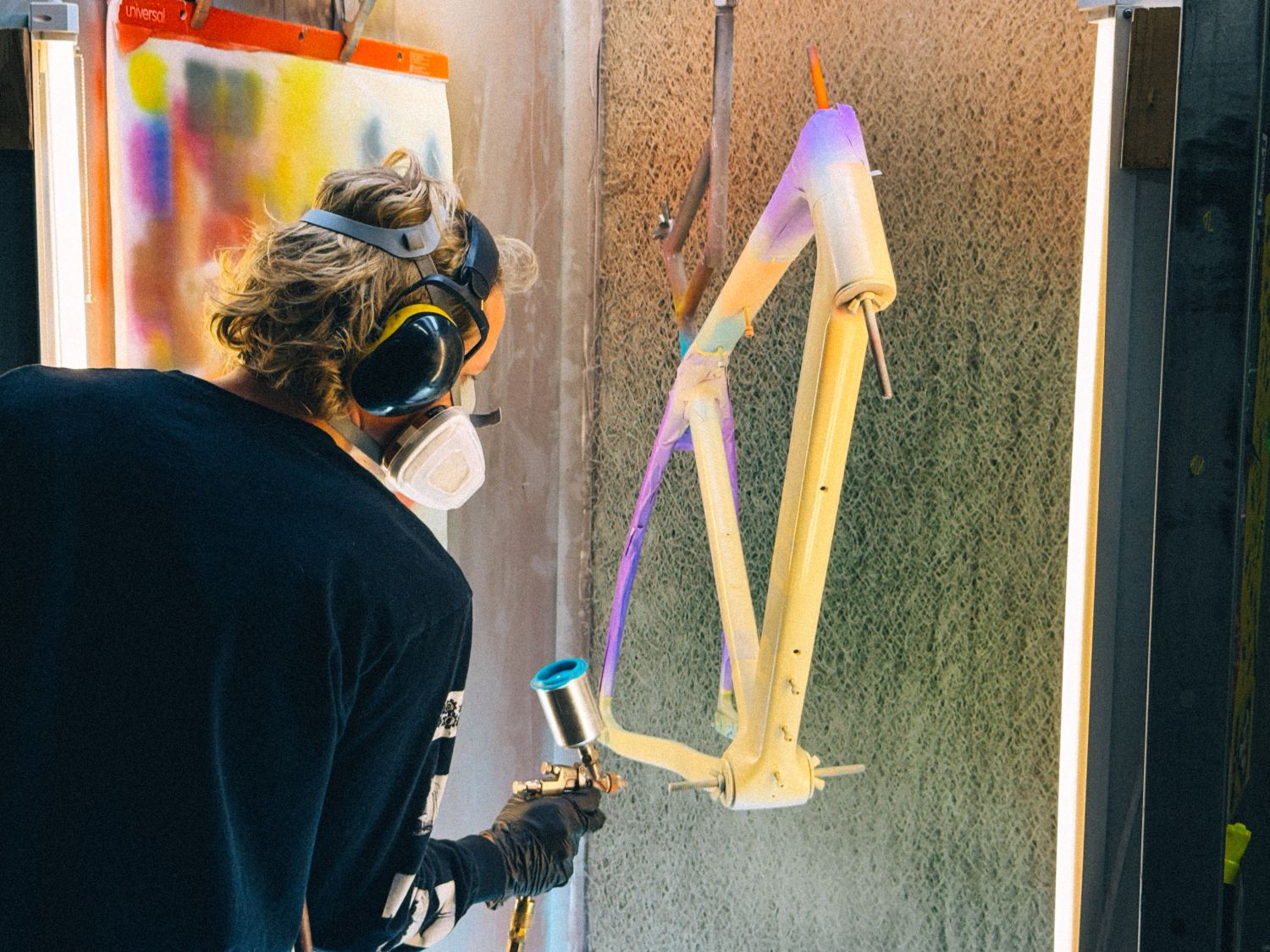
We try not to warehouse a lot of other things any more than we have to, so we run a lean inventory on all of the other bits that make up a bike. Whatever we have in stock, we’ve already paid for, we already own, and it isn’t subject to tariffs. Because of that, we don’t have to raise prices on anything that is currently in stock. Could we? Yes. Would it be opportunistic to raise prices on in-stock inventory and blame on “Liberation Day”? Yes. Is it happening elsewhere? Yes.
But no, if it’s already in-stock and landed, we won’t raise costs on anything that we don’t have to, because that doesn’t feel right to me.
Incoming Inventory
Nothing is simple is it? In the world of micro bike companies it isn’t. As it turns out, we have frames leaving Asian factories throughout the next two months. Some are in-transit exactly right now. What will happen with those frames? Will we jack up the prices if we lose bigtime on timing, and we don’t have those frames through customs before the bigger tariffs kick in? For pre-paid customers, the answer is almost certainly “no”. If you’ve bought a bike, and it is our fault that it is late, we’re not going to penalize you by tacking on additional costs due to tariffs. The only exception I can think of to that scenario is if, for instance, the Chinese tariff battle in particular gets so bad that the pricing gets thermonuclear, and we simply can’t afford to land said product without circling back to our customers with our hands out – almost begging. In that scenario, were it to get that bad, I would imagine that a customer would either realize that we’re all in this tariff nightmare together, or they would just cancel their order because why would anyone pay so much for a bike?
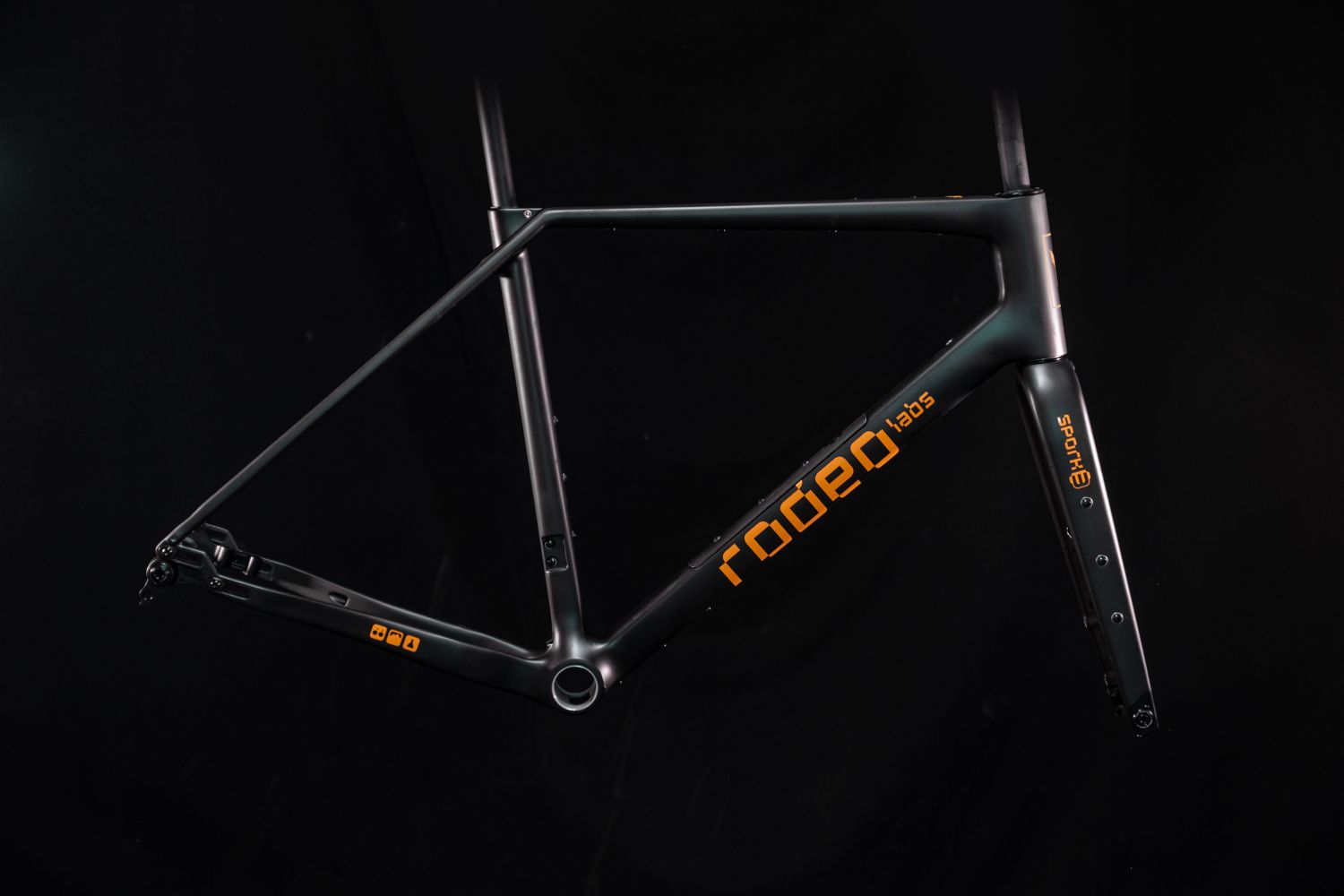
We have a fair number of industry-pricing and pro-deal frames incoming. For those people we’ll leave the stated pricing in effect if at all possible, but if we end up in a situation where we have to lose money to honor stated pricing, we won’t be able to bear that, and we’ll have to raise the pricing even on EP frames or industry deals that were already sold.
If any of this feels unfair so far, feel free to call the White House, or perhaps attend a protest. Remember, this post is about bikes, but this post isn’t about bikes at all, is it?
Future Inventory and pricing
What does the Rodeo future hold outside of our immediate incoming inventory? Truly: I HAVE NO IDEA. Perhaps all of this is truly an elaborate bluff, or negotiating tactic, or precarious economic chess by the current administration. Or perhaps it’s total, utter arrogance and stupidity. Whatever it is, Rodeo Labs is effectively a dinghy in a perfect storm. We will fight as hard as we can, we will be as creative and shrewd as we can, and we will work to maneuver to the left, and to the right, to evade the waves that very much threaten to swamp us.
If tariffs hold, we’re going to raise our prices and everything inside and outside of bikes will become more expensive. In light of that, for sure sales will slow. In light of that, for sure stressed companies throughout the economy will bite the dust. It doesn’t particularly help that the bike industry is still recovering from its COVID induced economic cold. This situation is akin to having a cold, then getting the flu, or the shingles, whichever is worse.
So, let’s just make things here, right?
Any sane person could see that the bike industry has been exposed to Asia-related manufacturing risk since at least the COVID era. Remember jammed ports? Remember factory closures? Remember factories booked out for five years? I do. Many brands started leaving China for supposedly safer adjacent countries in the last half dozen years. Even Mexico has been seen as a new manufacturing frontier as companies de-risked their manufacturing supply chains post COVID. Rodeo certainly looked into it, and we’ve moved some things around ourselves.
Even in that era our reliance on what proved to be an incredibly fragile Asia supply chain struck me as unsustainable after Rodeo endured three years of delayed shipments, failed QC, and finally a factory that quit us cold and nearly left us insolvent. For our own part, that became the spark for our slow moving but hard headed project to build bike frames in America, which we deemed Project Denver. Still far from maturing into a final product, Project Denver has been our attempt to stand back from how we currently do things at Rodeo Labs and find a way to make as much of our frameset production pipeline as vertically integrated as possible, with a few novel solves thrown in. I wish I could say that we had resolved this project in time for the current calamity, but we aren’t there yet. More on Project Denver some other time…
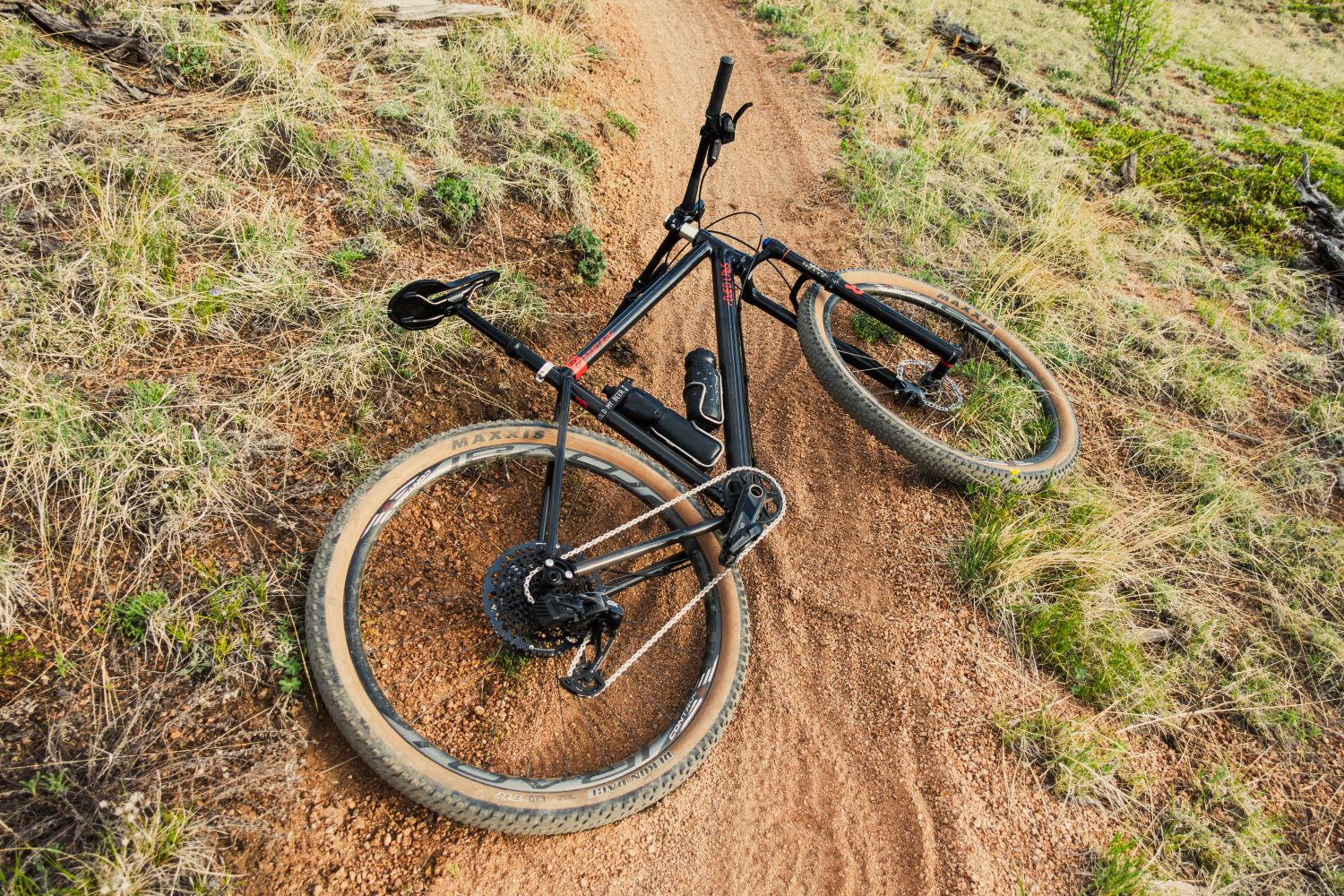
Other brands, notably Stinner, also saw a better way forward and created a totally new pipeline for making metal frames at scale here in the US. They are well poised to benefit from their vision in this current tariff scenario. Companies like Paul, Chris King, White Industries, and other USA based component or bike manufacturers are well poised with more competitive pricing relative to now-more-expensive Asian good. Good for them, and I really mean that. I deeply, achingly, wish we made a whole lot more stuff in the USA.
Making bike frames in the USA won’t solve all that ails us in this tariff war though, as nearly everything other than the frame still mostly comes from Asia. Even if frame prices remained stable, total built bike prices will still have all of the potential to spike dramatically in the coming months.
Supposedly, a major force in these tariffs is to bring manufacturing jobs back to the USA, the same jobs that we eagerly exported a few decades ago. I don’t see that as a totally realistic goal. What seems more obvious to me is that most Americans don’t want to be employed making anything at all. Truly, many of us don’t even want to have to report to an office. Even if Americans might want to make more stuff, manufacturing wages aren’t sufficient for many people to live out the mythical American Dream. The more people want to be paid, the more expensive stuff has to cost, the more money we need to buy that same stuff. It’s a snake eating it’s tail. Perhaps a society based on consumerism and buying stuff isn’t infinitely sustainable? That’s crazy talk!
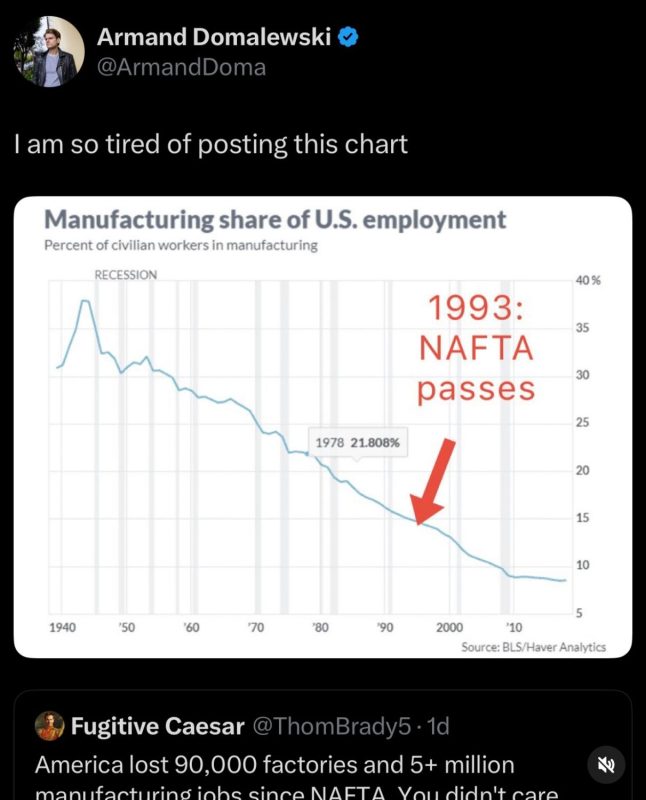
Our USA economy, or perhaps culture, seems to, in a large part, be post-manufacturing, and far more into the glamor, prestige, comfort, and high wages of the “idea” economy vs the “physical product” economy. Do Americans want to sew cheap denim pants for 16 hours a day? No. Do Americans want to work on tedious assembly lines? No. Do Americans want to lay carbon into bike frame molds, or sand a single frame for 8 hours at a time? Almost universally, no.
Do Americans want to live van life with a satellite internet connection, ride the trails in the morning, punch out a few hundred lines of code in the afternoon, and then take a selfie of themselves winning at life right at golden hour? Yes? I wouldn’t decline that life, for the record.
Take a look at three prominent USA carbon bike manufacturers in the recent and present bike industry, Alchemy, ENVE, and Allied Cycles. Alchemy for over a decade produced some of the most beautiful and lust worthy USA made carbon frames in the business. ENVE was (is?) the premiere name in USA made carbon. Allied’s entire story has, from day one, been “Made Here”, and they have a tidy logo that states it on every frame they ship(ped). All three of these companies did USA for a minute, and may even continue to do it on some levels, but all have also slowly seemed to bow under what I would guess are the two challenges of making a carbon bike in the USA: Finding good labor to make the bikes, and finding a way to make the bikes at a sustainable and ongoing profit margin. Enve prominently states “Made in the USA”, even though that statement is probably only accurate for half of the things it sells. They started making bikes with the Custom Road frameset, which is made in the USA, but ENVE has long since moved the MOG, Melee, and Fray frameset production to China, along with certain rims, forks, and other components.. Alchemy did for a long time make all of their road and MTB frames here in Denver, but also ultimately found it necessary to pivot to China in order to make them cost competitive and profitable – before eventually shutting down their entire USA (metal and carbon) frame making operation all together. Allied held their ground stubbornly, and admirably, backed by generational wealth, right up until the point that they didn’t. They first moved the rear swingarm of their MTB to Asia, and more recently are moving their newly announced Able frameset to China as well. History is repeating itself, a-la Trek, Cannondale, Specialized, Ritchey, and nearly everyone else.
Am I throwing shade here? Maybe a little bit, because any brand built on Made In USA, and charging more because of it, should be extremely up-front about it if they move overseas. But ultimately, I can’t really throw full shade for two reasons: The first being that Rodeo has never made frames in the USA and who are we to judge, and second, it’s not any of these companies fault that labor, rent, and materials are expensive in the USA, and that the total market for $5,000+ USA made frames isn’t large enough to build sustainable, scalable companies on. The American consumer deserves some blame for this also. Most of us, myself included, vote with our wallets, and buy the cheaper, overseas made item at nearly every opportunity. If the customer to support American manufacturing doesn’t exist, neither does American manufacturing.
And if I’m throwing a little shade, I should also kudo all of the cycling companies, more than I can even list here, that are grinding it out and living the dream of Made In USA cycling.
I could never complete the entire list, there are hundreds, if not thousands of small USA made cycling brands, and they should all be celebrated. How did they crack the code? That’s another article, written by someone else, for another time.
Will tariffs fix any of this USA manufacturing conundrum? They claim that tariffs are the “medicine” that we supposedly need to swallow to fix our manufacturing problem, but I don’t think they are the solve at all, or at least not all of it. In November I spoke to a $1200 / hr Washington DC lawyer with intimate knowledge of of tariffs and trade policy. I was trying to make sense of what was coming, and what we should do about it. One question I posed to him was “Instead of penalizing American companies with tariffs for not producing here, could the government provide grants, tax breaks, subsidies, or other incentives to help companies be able to afford to bring manufacturing home”?
His answer: “That’s a great idea, do you have a lobbyist?”
You know who does provide grants, tax breaks, subsidies, and other incentives to help build and support its manufacturing base? China does, that’s who.
Conclusion
Tariffs are going to have a lot of effects, tariffs are going to raise the prices of Rodeo Labs bikes, and also everything else you buy that isn’t a Rodeo Labs bike. Will tariffs bring balance to global trade, or bring home domestic USA bike manufacturing and production en masse? I doubt it, but I hope I’m wrong.
About a dozen times today, I stopped myself in my tracks and said to myself “this can’t actually be happening, this is insane, there is no way these tariffs go forward the way that they’ve been announced”. This whole situation seems utterly, impossibly, not logical. Moreover, there is no way that the American (voting) public will ultimately stand for the havoc that they are going to cause in our collective everyday lives. We’re all on a bus, and the driver is incredibly erratic, towards a cliff, and we the passengers are looking at each other like “at what point do we bum rush the driver and grab the wheel?”.
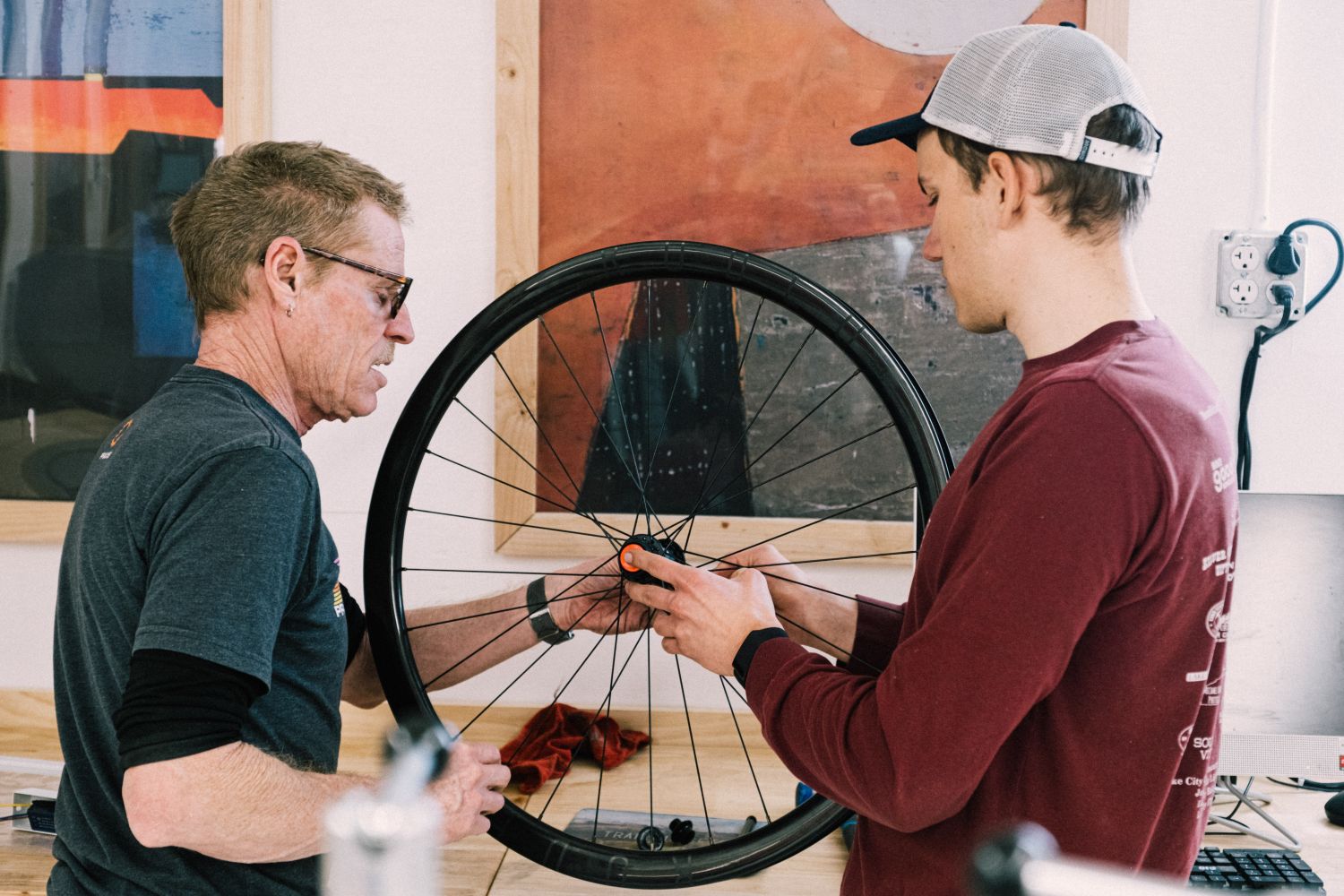
“We” aren’t going to put up with higher prices on top of already higher prices. We aren’t going to put up with the stock market crashing. We aren’t going to put up with losing hundreds of thousands or millions of jobs. At some point, if this all plays out in a way that finally hits home on an individual level, 270 million times over, our collective self preservation instincts will kick in and push back against the very few people who are imposing this set of policies upon not just the USA, but indeed the entire world. I’m not even sure if we’ll push back for noble reasons, or the right reasons, but I do think we’ll push back for the most primal reason: looking out for ourselves and the people that we love and care about. That’s one thing that you can bank on humans to do, every damn time.
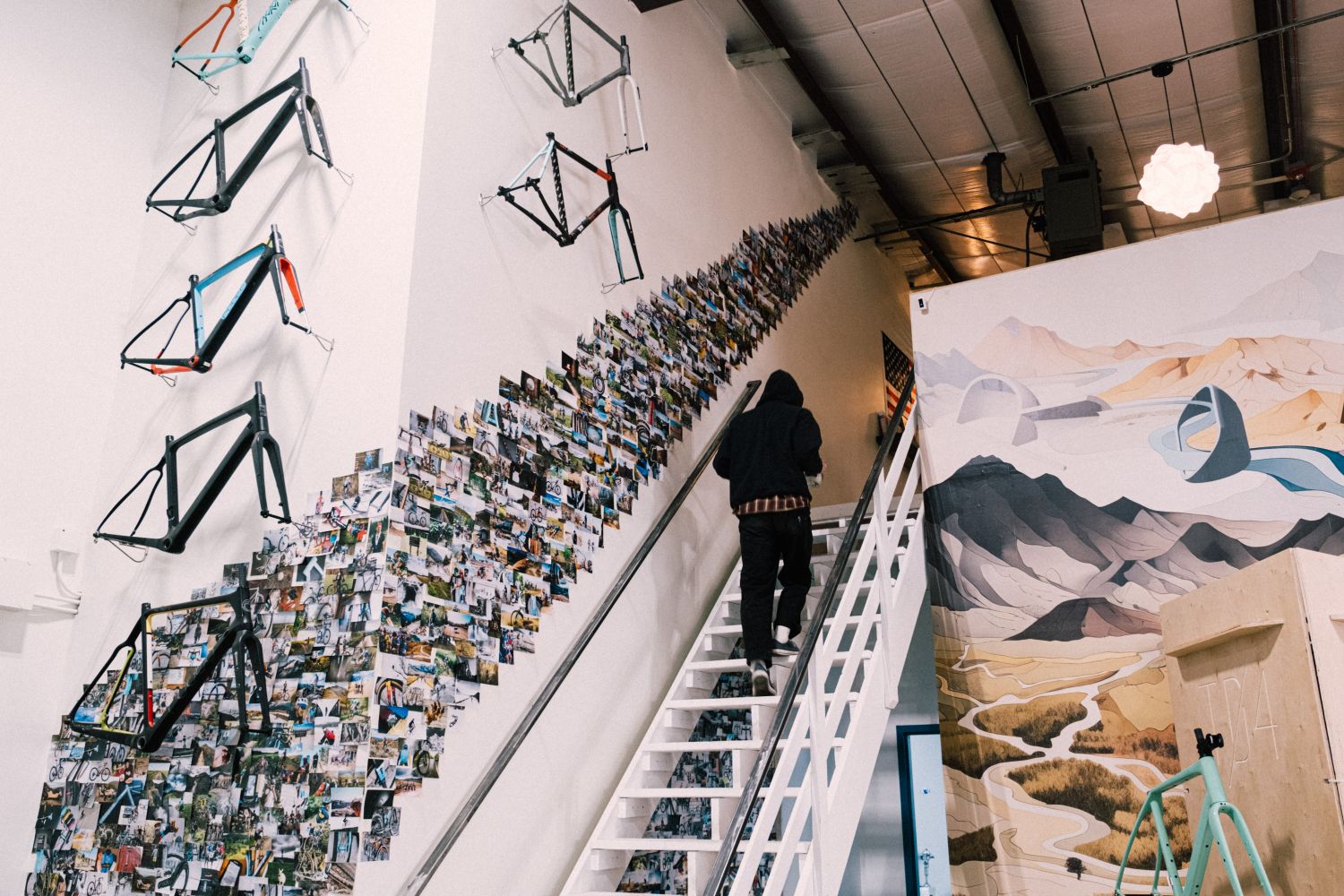
Whatever happens, I hope that Rodeo Labs; myself and the small group of people who work with me, and the community that extends out from that, is clever and resilient enough to see all of this through. Because on the other side of this, bike company paradise is definitely waiting, and another huge, unexpected global calamity is definitely not on the menu. Right?
One customer sent me an actual DM lamenting that that we’d survived COVID, only to be killed by tariffs. Not so fast there my guy, we have a lot of fight left in us! Our small scale may make us vulnerable, but nimble enough to adapt to more than som. When nimble fails, sheer determination often covers the spread. No matter what, this is going to take finesse.

I remember in March 2020, when COVID hit, it seemed like nobody else would ever buy a bike again. I said to myself “oh well, we’ll just go back to our roots, telling bike stories, and sharing photos of our adventures until things improve again”. It turns out that things improved, and then went absolutely crazy, not more than two weeks later.
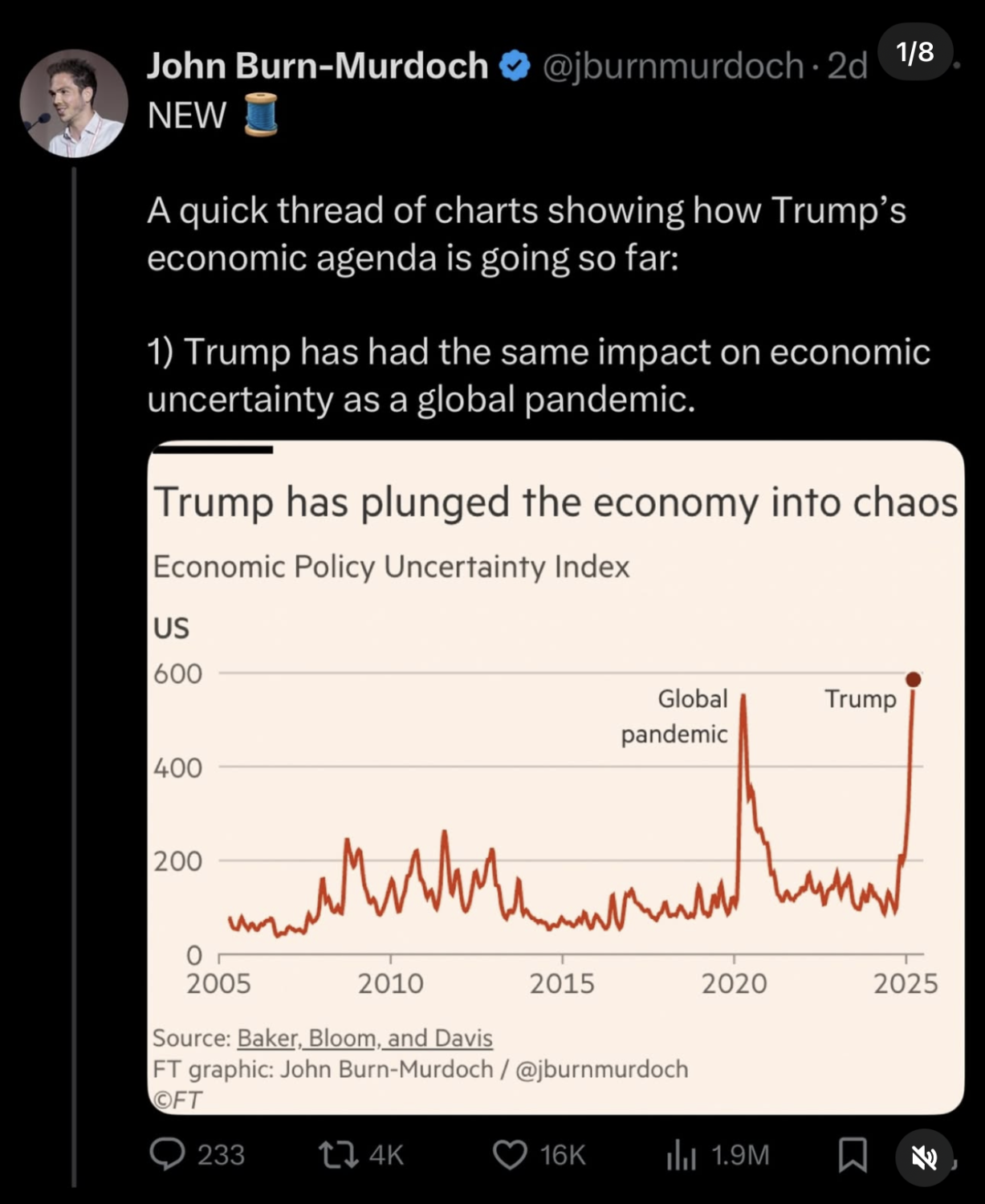
In the meantime, what I know is that today, now April 8th as I tidy this piece up, we didn’t raise our prices. Some day after today we will probably have to, because we’re still all on this bus, and it’s still careening towards the cliff. As self serving as this statement is: The best time to buy a bike in the probable future is probably exactly right now.
Or, alternately, you could just continue riding the one or five bikes that you already have. If the stress of all of this is just too much to handle, I highly recommend putting down your phone, or your laptop, and heading outside for a restorative ride in the fresh spring air. I went on such a ride just this morning, and it felt wonderful.
Deep breaths everyone! We’ll get through this together.


13 Comments
Thank you for your perspective! We are feeling the pinch right now. It’s painful, but hopefully it doesn’t break the skin!
As long as you believe in yourself others will continue to believe in you. Still hoping to see the Rodeo Labs Show Pony in the near future.
Thank you for taking the time to write and share. As a Canadian, there is a lot of “don’t buy USA” going on right now. Elbows up and all that wonderful nationalist comradry I hope that’s short term, and as a community, this current situation brings us closer together. “Us” being smaller private businesses, and those who care about craft, community and environment. I hope in the future we are able to define “local” as people and businesses that share these values, transcending the physical borders (and tariffs) that until now have defined us.
I deeply regret that a single person has the power to turn friends with decades or centuries of friendship into animus overnight. Undoing that damage certainly won’t happen overnight, but I trust and hope that it will be possible. True human to human connections are of even more importance right now, because they have the durability and strength to supersede the machinations of the powerful elite.
We’re still friends. Many of us Canadians, while upset with the currently political fire, know that not all Americans support what the current administration is doing. We will all eventually get through this!
Good words. For the record, shingles are WAY worse than the Flu. But that’s a story for another time.
Really glad I clicked on the ‘CEO buys a yacht’ link.
Thanks for your insights, enjoy the ride
Good read. Bike still heal the soul.
What a good post!
Thank you so much for taking the time to think deeply and write about this topic. We’re all very clueless, and starting to read well-founded opinions is important.
Our species’ tendency is inevitably against these kinds of retrograde policies, so I suspect all this madness will be temporary, or so I hope.
We are European but we ship about 25% of our bikes to the US, and it seems they’ve added a 20% tariff to any product from Europe, so we’ll also be quite affected. Let’s not even talk about the reciprocal measures Europe wants to take now, which would make the Chris King headsets or other US-made parts we mount on our bikes even more expensive, making things even worse.
Good luck and stay strong, we’ll get through this!
I wish you all the best navigating this! I think the more companies talk and share their experiences with customers and other companies, the more the industry can pull together and help each other plan and adapt.
Project Denver? Should’ve bought up Guerilla Gravity..
We attended the Guerilla auction and bought up some minor items, but we weren’t the right company to take their tech and keep going with it. Pretty sure the frame and wheel patents went to separate parties.
I really, really, read the humility through the lines. The moral dialogue that many of us in the industry are experiencing right now is relatable. Thanks for such an honest reflection and for saying something when so many people are waiting to see what others are going to do.